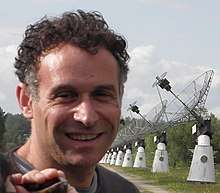Jeremy Quastel
Jeremy Daniel Quastel FRSC is a Canadian mathematician specializing in probability theory, stochastic processes, partial differential equations. He is currently head of the mathematics department at the University of Toronto.[1] He grew up in Vancouver, British Columbia, and now lives in Toronto, Ontario.
Jeremy Quastel | |
|---|---|
 Quastel visiting the Nançay radio observatory in France on 6 July 2012 | |
| Born | December 20, 1963 (age 56) |
| Citizenship | Canadian |
| Alma mater | New York University |
| Children | Sophie Quastel and Elias Quastel |
| Scientific career | |
| Fields | Mathematics |
| Institutions | University of Toronto |
| Doctoral advisor | S. R. Srinivasa Varadhan |
Career
Quastel earned his PhD at Courant Institute of Mathematical Sciences at New York University in 1990; the advisory was S. R. Srinivasa Varadhan. He was a postdoctoral student at the Mathematical Sciences Research Institute in Berkeley, then a faculty member at University of California, Davis for the next six years;[2] returned to Canada in 1998.[3]
Research
Jeremy Quastel is recognized as one of the top probabilists in the world in the fields of hydrodynamic theory, stochastic partial differential equations, and integrable probability.[2] In particular, his research is on the large scale behaviour of interacting particle systems and stochastic partial differential equations.[3]
Awards, distinctions, and recognitions
- CMS Jeffery–Williams Prize (2019)[4]
- CRM-Fields-PIMS prize (2018)[2]
- Royal Society of Canada Fellow (2016)[5]
- Killam Research Fellowship (2013) for his research of stochastic processes and partial differential equations used to describe natural processes of change and evolution[6]
- invited speaker at the Current Developments in Mathematics (2011)[7]
- invited speaker at the International Congress of Mathematicians in Hyderabad (2010)
- Sloan Fellow (1996–98)[3]
Family
Jeremy Quastel is the grandson of biochemist Juda Hirsch Quastel.
Sources
- "Faculty". Department of Mathematics, University of Toronto. Retrieved Oct 21, 2019.
- "Professor Jeremy Quastel Named Winner of the 2018 CRM - Fields - PIMS Prize". Pacific Institute for the Mathematical Sciences. Dec 11, 2017. Retrieved Oct 21, 2019.
- "Home Page of Jeremy Quastel". www.math.toronto.edu. Retrieved Oct 21, 2019.
- "Jeffery-Williams Prize". Canadian Mathematical Society. Retrieved Feb 12, 2020.
- "Eight U of T science faculty join Royal Society of Canada as fellows". Sep 26, 2016. Retrieved Oct 21, 2019.
- "Jeremy Quastel, leading mathematician". University of Toronto News. Retrieved Oct 21, 2019.
- "CDM Conference 2011 (Current Developments in Mathematics)". www.math.harvard.edu. Retrieved Oct 21, 2019.